Richard Leonard: Who is the former Scottish Labour leader?
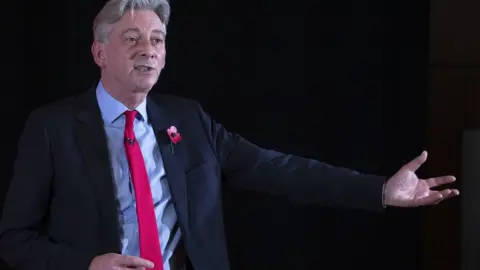 PA Media
PA MediaRichard Leonard has stepped down as Scottish Labour leader after three years in the post. He said speculation about his leadership had become a distraction, just four months before the Holyrood election.

Richard Leonard was born as the son of a tailor in North Yorkshire in 1962.
In 1980 - the year after Margaret Thatcher became prime minister - his father lost his job with the company he had worked for since leaving school, with his parents and younger sister having to move to the south of England in search of work.
For Mr Leonard, it was further proof that working-class communities across the country were being torn apart by Mrs Thatcher and the Conservatives.
He was, by that stage, already studying politics and economics at Stirling University, where he was a friend, and later a flatmate, of future Scottish first minister Jack McConnell.
Mr Leonard's life had taken an unexpected twist seven years earlier when he won a fully-funded scholarship at the private Pocklington School, where he mixed with children from considerably wealthier backgrounds.
In an interview with The Scotsman newspaper, he described how attending the school had made him acutely aware of Britain's class system, adding: "The bright kids I was at primary school with ended up working in factories and railways to a large extent.
"For me, the outcome was different."
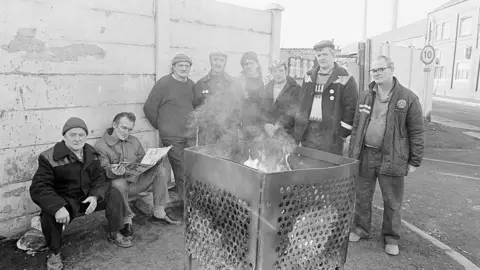 Getty Images
Getty ImagesMr Leonard became interested in the ideas and writing of left-wing Labour MP Tony Benn, which he admits marked him out as being "quite unusual" at Pocklington.
These ideas would remain a major influence on him throughout his life.
In 1984, he became Stirling University's student president, and has described organising collections for coal miners who spent that year on strike.
After graduating, Mr Leonard became involved in local politics in the Stirling area and worked as an aide for Labour MEP Alex Falconer.
He then spent five years working for the Scottish Trades Union Congress - and a further 20 as an industrial organiser for the GMB union.
Mr Leonard was Anne McGuire's election agent when she heavily defeated then-Scottish secretary Michael Forsyth in the 1997 general election.
He also served for a time as the party's chairman, but it was not until the 2011 Scottish Parliament election that he attempted to enter frontline politics by standing as the Labour candidate in Carrick, Cumnock and Doon Valley.
Mr Leonard finished second to the SNP in that contest - but was elected to Holyrood five years later as a list MSP for the Central Scotland region.
 ITV
ITVHe was almost immediately appointed as the party's economy spokesman by Kezia Dugdale, who Mr Leonard was to replace as leader in acrimonious circumstances just over a year later.
Ms Dugdale announced her resignation in August 2017, saying it was time to "pass the baton" to someone else.
She had been a vocal critic of then-UK Labour leader Jeremy Corbyn, leading to accusations from some of her supporters that she had been the victim of a left-wing plot to undermine her authority.
When Mr Leonard announced he was standing for the leadership, few outside the Holyrood bubble knew much - or anything - about him, although he was widely liked and respected within the Labour movement.
The centrist Anas Sarwar was initially seen as the favourite, with the contest - which saw Mr Leonard win the backing of all of the major trade unions - being marred by personal attacks, accusations of plots and claims of underhand voting tactics.
Mr Leonard ultimately emerged as the clear victor, winning a 56.7% share of the votes to Mr Sarwar's 43.3%.
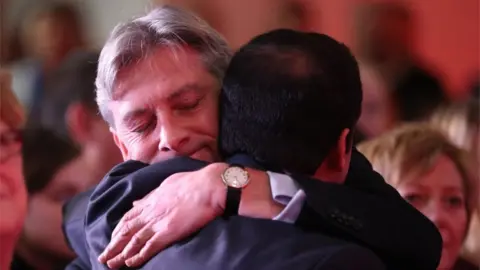 PA
PAIn doing so, he became the first Scottish Labour leader to come from the left of the party - and the first former trade union official to lead it.
The result was largely overshadowed by Ms Dugdale announcing on the same day that she would be appearing as a contestant on the ITV reality show I'm a Celebrity... Get Me Out of Here!
Mr Leonard had received celebrity endorsement during the leadership contest from comic book writer Mark Miller, who described him as "the most exciting thing to happen up here in decades".
But from the start, there were concerns from some within the party about his leadership style.
They said he came across as stilted and uncharismatic, with critics saying he was more suited to trade union committee meetings than modern politics.
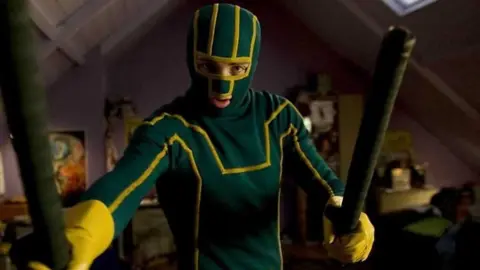
He took some persuading to eventually sign up for a Twitter account, for example, and has struggled to master the platform ever since.
And his close association with Mr Corbyn did little to rally many of the party's more centrist MSPs behind him - with a reshuffle that saw some of them losing their front-bench roles in October 2018 doing little to improve their mood.
Mr Leonard did attempt to distance himself somewhat from his UK counterpart, insisting that he was his own man and a "little long in the tooth to be a Corbynista".
But he introduced policies that were much more left-wing than his predecessors, including plans to nationalise the railways and greatly increase taxes for wealthier Scots.
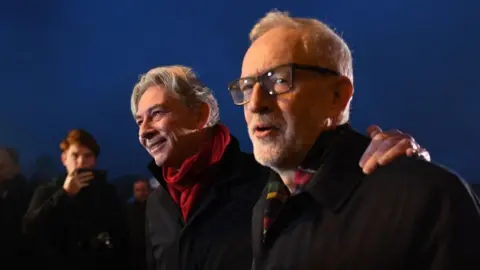 Getty Images
Getty ImagesAny hope that this shift would lead to an immediate uptick in the dismal fortunes of the party that once dominated Scottish political life largely evaporated when it finished fifth in 2019's European Parliament election.
This was followed soon after by Scottish Labour losing all but one of its MPs in the snap general election - with polls suggesting that its fortunes were unlikely to improve any in next year's Holyrood election.
The discontent from some within the party, who saw Mr Leonard as an outdated relic of Mr Corbyn's time in office, erupted into open revolt in September 2020 when four MSPs openly called on him to resign.
At that point, Mr Leonard insisted he had no intention of doing so - and accused his opponents of sabotaging his efforts to improve the party's fortunes.
He ultimately survived the coup attempt, when a confidence vote planned for an executive committee meeting was pulled at the last moment.
But Mr Leonard spent the festive period thinking over his position - and came to the conclusion that he should quit after all.
His resignation statement on 14 January said that the "speculation about my leadership" had become a "distraction" to efforts to get the party's message across.
And he said he had concluded that "it is in the best interests of the party that I step aside with immediate effect".
The decision leaves the party scrambling to find a new leader, just 16 weeks before a Holyrood election.
